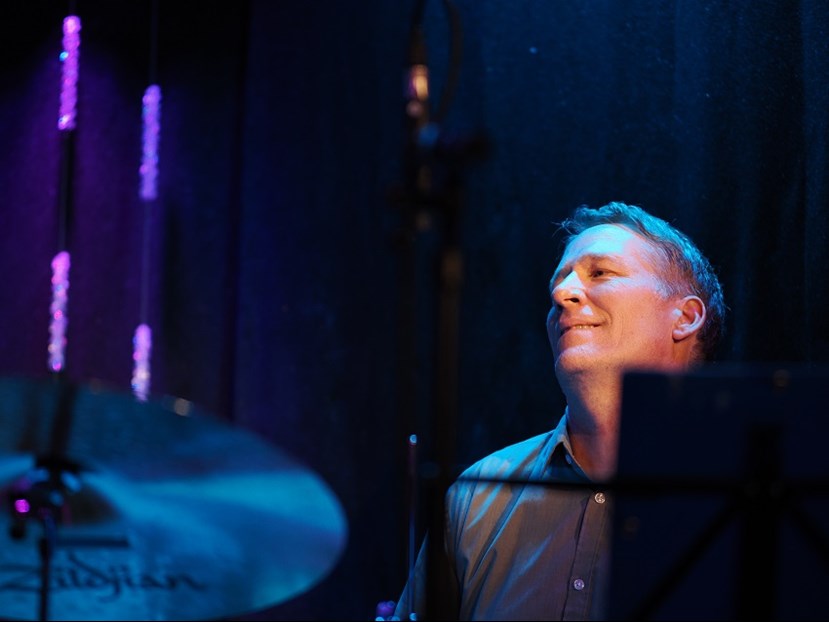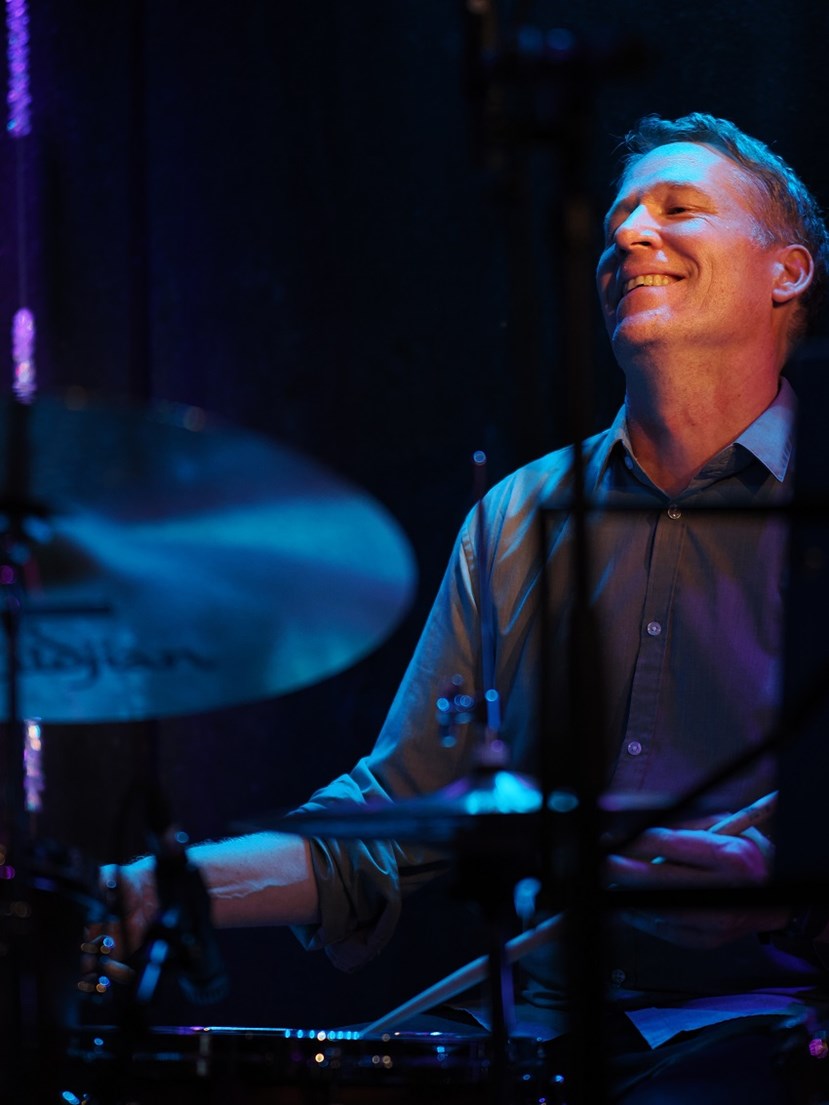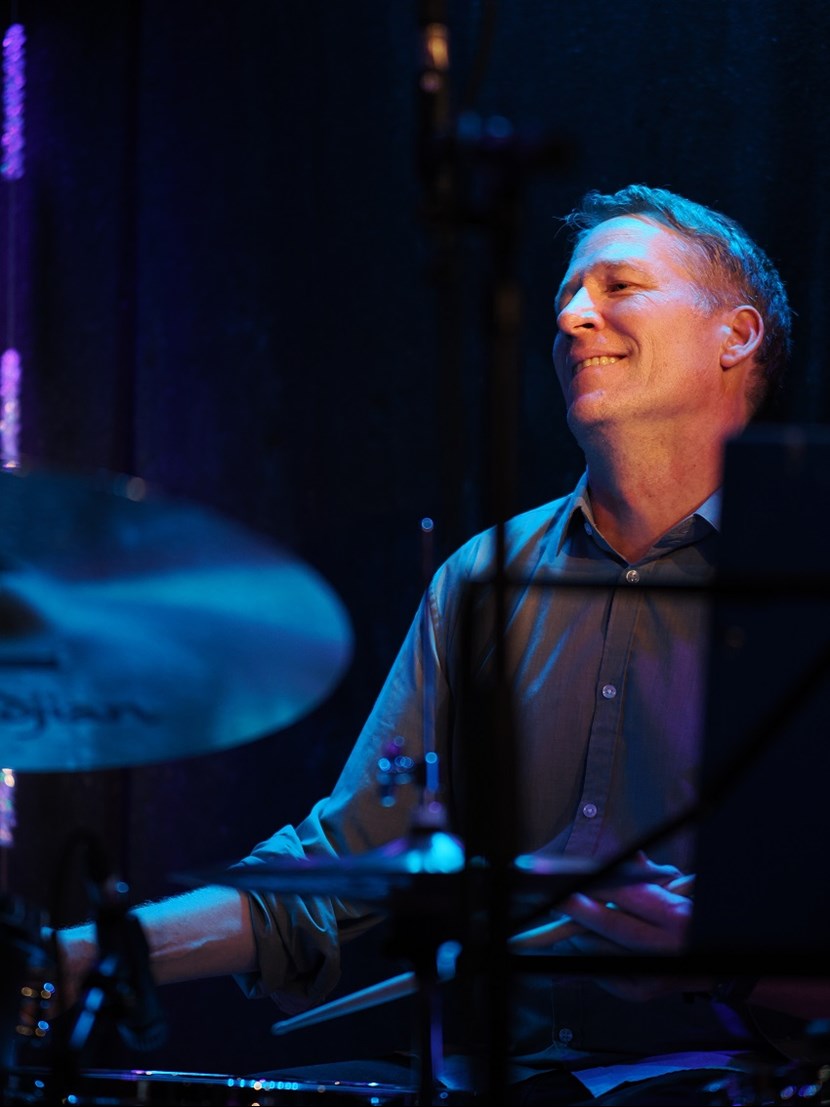Carsten Lindholm : conversation with the Danish drummer

The interview was conducted by Ferdinand Dupuis-Panther during Jazzahead 2023 in Bremen.
Why did you start to a career as drummer in the first place ?
Carsten Lindholm : it was quite a funny story, because we had a basement, where I was banging on cans and soap containers. Then my mother saw an ad in a local newspaper, that the local school orchestra was looking for drummers. You could come to an open audition. The class room was filled with drummers. They all had their pair of sticks with them and a kind of wooden board too. They chose 5. We studied with a conservatory teacher, and learned about the classical snare drum technique and drum set. Besides that we played with the school orchestra.
Have you tried out other instruments before ?
Carsten Lindholm : No. It was later that I began to play the piano a bit, mostly used as a composing tool.
How would you characterize the role of the drummer in a Jazz band ?
Carsten Lindholm : It is a combination. He/she is the time keeper, the mood setter with the role of keeping the band together. There are sometimes musicians who are ahead off the beat or behind, where it is up to the drummer to keep it together, and also to create a dynamic feel and mood.
Is timing the most important part of a drummer as the drummer Ginger Baker in interviews put forward ?
Carsten Lindholm : It is a kind of basic that you are the one responsible for the timing. But the other musicians need a certain understanding of timing too to connect in a band and playing together. I am also mostly interested in expression. Drummers like Paul Motian, Jack DeJohnette, Manu Katché, Jon Christensen, Peter Erskine, Brian Blade are/were all vibrant expressive dynamic musicians, who I always find very interesting to listen to. They all have/had different vibes, but all of them have/had a strong inspiring original way of expressing music.
When did you even start making your own music ? Can you recall it ?
Carsten Lindholm : I played a lot of gigs as a sideman many years after I moved to Copenhagen in 1991, mostly jazz gigs. I lost my father in 2006, and I needed some own way of expressing myself. I started composing electronical music using a computer. I was at a computer studio. They had the Swedish music program Reason. After that I got more and more interested in composition, and production.

Is it actually essential that a musical career is based on a music-loving family? Or is that not so important and entirely up to your own intrinsic motivation ?
Carsten Lindholm : It is different. You can get inspirations from teachers in school or radio and TV. I was fortunate cause my father played piano. My grandfather played the violin in a symphonic orchestra. There was a lot of music in the house. When I left the school orchestra, I studied with drummer Ulf Scott, who was from my hometown, and moved to Copenhagen later. At that time my hometown Kerteminde, was a small town with approx. 5000 inhabitants with not much going on. I studied with Ulf. He played in different bands, and studied with the drummer of Michel Camilo at that time Joel Rosenblatt in New York. Ulf changed my whole perspective of, what was possible and motivated me to move to Copenhagen.
Then I started to dive into the music of Michel Camilo, an amazing pianist, who had his own way of playing Latin jazz. Later I hooked up with Jazz drummers, and learned more about the history of Jazz. I did research at the local music library every day discovering many genres like Jazz, Classical, Funk, Indian Classical music a. o….
Why did you choose to study at the Jazz Academy and D.A.R.K. ? Did you pick these institutions in relation to the teacher there ?
Carsten Lindholm : I applied for the official conservatory but I was too immature in terms of playing piano. I did not find it that interesting at that point. I prepared with Åge Tanggaard for the session to join the conservatory. We talked about, if they should let me go to the 2nd round, but as I was not keen on playing the piano I decided not to go further.
Instead I started at D.A.R.K. a private conservatory, where I got the teacher Carsten Dahl, who started as a drummer but now is a Danish piano player. He taught me a lot about Jazz, Elvin Jones, the piano/drums connection, and later recommended me to study with the legend Ed Thigpen (Oscar Peterson, Elle Fitzgerald, Ben Webster), who lived in Copenhagen. I studied with him a couple of years. He taught me about the basics of jazz, timekeeping, coordination, being open minded towards all kinds of music, and so much more.
Can you remember when you first came into contact with Jazz ? Through radio programs, going to a concert or through a specific Jazz album ? And if the latter, which album was that ?
Carsten Lindholm : It was part of my study. I listened a lot to „Night Train“ by Oscar Peterson, where Ed Thigpen was the drummer, and absorbed his intense hard swinging music. Later on I got into Yellowjackets (The Spin, Greenhouse, Like a River) and Lars Danielsson (European Voices), Esbjörn Svensson... They had different kind of vibes. For my drum studies, I spent a lot of time with the Pat Metheny Trio album „Question and Answer“. It involved tradition, and was also very modern on the other hand. I memorised a lot of the solos from Metheny, and then it was just a matter of learning, learning and learning.

Have you ever been influenced by Max Roach, Art Blakey, Gene Krupa or Buddy Rich to mention only a few legendary drummers in the history of Jazz ?
Carsten Lindholm : Actually I started my CD research studies with Art Blakey and his hard driving strong drumming. Then I got into Elvin Jones. He had a kind of African way of playing Jazz. It is very circular as Adam Nussbaum, who is rooted in the same tradition. It is the strong intense swinging beat, which fascinates me.
How important is the American Songbook considering your career ?
Carsten Lindholm : In the past I played many gigs with the Real Book repertoire. I did a lot of gigs playing Jazz standards for many many years. But in 1996 I went to a summer camp with Lars Danielsson, who was my teacher then. I was then more affiliated to the Nordic traditional music, and a kind of Scandinavian Songbook.
Do you see an independent pathway of Jazz in Europe ?
Carsten Lindholm : Definitely. There is a tendency that the music derives from the roots of your heritage thinking of e.g. Esbjörn Svensson, Jan Garbarek. Danielsson, or outside Europe Ibrahim Malouf, who uses his Lebanese roots, Trilok Gurtu using his Indian roots, and Shai Maestro with his Israeli roots.
I recently went to see Lars Danielsson and his quartet at Jazz club Montmartre. Lars mixes his classical background, Swedish roots and odd meters, which I guess comes from his time with Trilok Gurtu. Every time it amazes me, how effortless, tasteful, melodic and strong expressive they play.
Finally, let us talk about your projects set up like the trios with Jan Gunnar Hoff and Reggie Washington and Jan Gunnar Hoff and Jasper Somsen. Why did you decide the trio is a formation you really want to play in ? Could you describe the character of Jazz you perform with these bands, please ?
Carsten Lindholm : I feel that the trio format gives you a better opportunity to leave space in the music, and the interaction/communication/improvisations has different options, than in bigger constellations.
The trio with Reggie Washington and Jan Gunnar Hoff is my trio, where I am the leader. We are playing my songs and arrangements of pop songs, which you might label as new standards. Like songs by Coldplay, Sting, Sam Smith and others. I met Reggie actually through his wife, who had a booth at the Jazzahead. We then hooked up and played in a studio at Copenhagen. It was great fun. We played quite some gigs in Germany.
I got to play with Jasper Somsen, when he was a substitute for Reggie during a gig in Bayreuth with Jan Gunnar on piano. Since we had a strong and special chemistry together the three of us, we decided to found a shared trio. It is very exciting. We expand the influences, the market, share music writing/arrangements of some songs, combined with impro songs, and our own songs. We have scheduled an album recording in September with release next year. I also have a lot of unreleased songs, which will be released, when the time is right.

I thank you for the interview...
Carsten Lindholm : Thanks a lot for inviting me!!
Text © Ferdinand Dupuis-Panther - photos © Carsten Lindholm
Other
In case you LIKE us, please click here:

Foto © Leentje Arnouts
"WAGON JAZZ"
cycle d’interviews réalisées
par Georges Tonla Briquet

our partners:



Hotel-Brasserie
Markt 2 - 8820 TORHOUT

Silvère Mansis
(10.9.1944 - 22.4.2018)
foto © Dirck Brysse

Rik Bevernage
(19.4.1954 - 6.3.2018)
foto © Stefe Jiroflée
Philippe Schoonbrood
(24.5.1957-30.5.2020)
foto © Dominique Houcmant

Claude Loxhay
(18/02/1947 – 02/11/2023)
foto © Marie Gilon

Pedro Soler
(08/06/1938 – 03/08/2024)
foto © Jacky Lepage
Special thanks to our photographers:
Petra Beckers
Ron Beenen
Annie Boedt
Klaas Boelen
Henning Bolte
Serge Braem
Cedric Craps
Luca A. d'Agostino
Christian Deblanc
Philippe De Cleen
Paul De Cloedt
Cindy De Kuyper
Koen Deleu
Ferdinand Dupuis-Panther
Anne Fishburn
Federico Garcia
Jeroen Goddemaer
Robert Hansenne
Serge Heimlich
Dominique Houcmant
Stefe Jiroflée
Herman Klaassen
Philippe Klein
Jos L. Knaepen
Tom Leentjes
Hugo Lefèvre
Jacky Lepage
Olivier Lestoquoit
Eric Malfait
Simas Martinonis
Nina Contini Melis
Anne Panther
France Paquay
Francesca Patella
Quentin Perot
Jean-Jacques Pussiau
Arnold Reyngoudt
Jean Schoubs
Willy Schuyten
Frank Tafuri
Jean-Pierre Tillaert
Tom Vanbesien
Jef Vandebroek
Geert Vandepoele
Guy Van de Poel
Cees van de Ven
Donata van de Ven
Harry van Kesteren
Geert Vanoverschelde
Roger Vantilt
Patrick Van Vlerken
Marie-Anne Ver Eecke
Karine Vergauwen
Frank Verlinden
Jan Vernieuwe
Anders Vranken
Didier Wagner
and to our writers:
Mischa Andriessen
Robin Arends
Marleen Arnouts
Werner Barth
José Bedeur
Henning Bolte
Erik Carrette
Danny De Bock
Denis Desassis
Pierre Dulieu
Ferdinand Dupuis-Panther
Federico Garcia
Paul Godderis
Stephen Godsall
Jean-Pierre Goffin
Claudy Jalet
Chris Joris
Bernard Lefèvre
Mathilde Löffler
Claude Loxhay
Ieva Pakalniškytė
Anne Panther
Etienne Payen
Quentin Perot
Jacques Prouvost
Renato Sclaunich
Yves « JB » Tassin
Herman te Loo
Eric Therer
Georges Tonla Briquet
Henri Vandenberghe
Peter Van De Vijvere
Iwein Van Malderen
Jan Van Stichel
Olivier Verhelst



